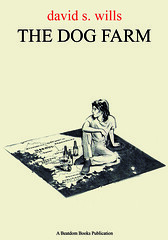For those of you who don’t know – and that won’t be many in this age of Twitter & Facebook – it is Banned Books Week. This valuable celebration of the First Amendment was begun in 1982 Judith Krug, and is celebrated annually in the last week of September.
First Thought, Best Thought?
It could be argued that immediacy was the style of the Beats. Certainly it was Ginsbergs’, and Kerouac professed to be driven by “Spontaneous Prose.” In the years following World War II improvisation and free-flowing first thought were integral to art. Jackson Pollack, Charlie Parker, Dizzie Gillespie… It wasn’t just the Beats. These artists were screaming in the face of a crushing conformity, and it was their apparent spontaneous creations that inspired the freedom of thought that characterized subsequent generations, movements and scenes.
The Beat Generation, Gonzo Journalism, and Crap Writing
Over at Charles Montgomery’s Korean Literature in Translation website, there is a small discussion on “weird” or “strange” writing. He was discussing a Korean novel that – whilst not entirely awful – seemed only to be strange for the sake of strangeness. I commented that this is something I see a lot as an editor, particularly as an editor of a Beat Generation-themed literary journal.
The Beats in Mexico City
Sadly this article came out a little too late for use in Beatdom #6: The Travel Issue, but it makes for some fantastic reading. I highly recommend you go read the whole thing.
The Beat Generation has always been associated with Mexico. From Kerouac’s interest in the culture and spirituality, to Burroughs’ need for escaping the US authorities, Mexico provided a playground for our favourite writers.
This article, from the Associated Press, details some of the more famous locations, and runs through the history of the Beats’ activities in Mexico City.
I don’t want to summarize anymore, because I’d be doing you an injustice. Please set aside five minutes and go read the whole damn thing. You won’t regret it.
Here’s the link again.
The Beat Generation and Korea
Since coming to Korea I haven’t really heard much about the Beat Generation. It’s hardly surprising, of course. The Beats are popular around the world, but they remain at their most appealing in English language-speaking countries.
Gary Snyder is popular in Korea. When I first came here he offered to introduce me to a few of his friends, but sadly that hasn’t yet happened. I came across this short essay about the history of Snyder studies in Korea. It makes for interesting reading.
I spent many hours last month researching a long essay about the significance of the Beats in relation to travel, and charted the journeys each of them took around the world. Allen Ginsberg travelled the most, with William Burroughs clocking up more miles than most people would imagine.
Ginsberg travelled around the world numerous times, and made it to Seoul in 1991, for the 12th World Congress of Poets. I tried looking for more information on this event, but couldn’t find much through Google.
I have some of Ginsberg’s “Howl” tattooed on my left forearm, and I always encourage my students to read it and offer their interpretation. Invariably they will tell me, “Teacher, everyone goes crazy?”
I found a short biography of Ginsberg through the Korean search engine, Naver. He is called 앨런 긴즈버그 and is referred to as part of the 비트제너레이션.
I found a Ginsberg collection and a copy of Burroughs’ Naked Lunch at What the Book? English bookstore in Seoul, but you won’t find Korean translations of these.
What you can find is Kerouac’s On the Road. As one of the most famous American novels, it is published in numerous languages. Although it is stylistically not the easiest text to translate, the meaning of On the Road is certainly easier to convey than that of Naked Lunch or “Howl.”
In Korean it is called 길 위에서, which literally means “on top of the road.” In Korean, Kerouac’s name is 객 케루악. You can buy this book from a Korean website called Gmarket.
There is a Kerouac biography on the Korean version of Wikipedia.
You can read a Naver biography of William Burroughs (윌리엄 버로스) here.



